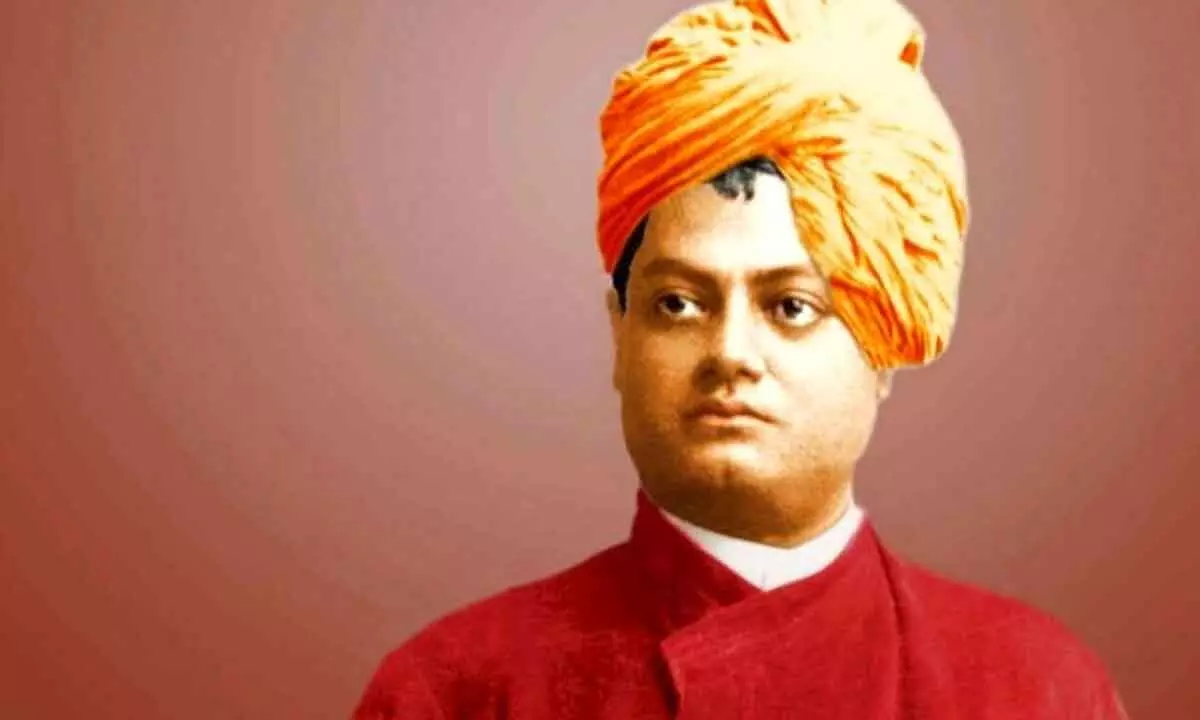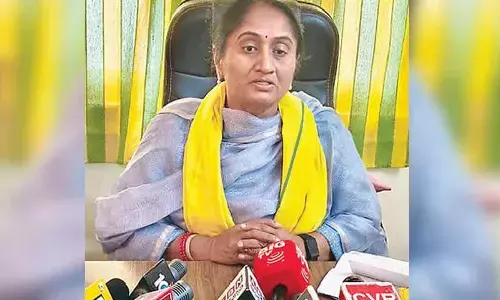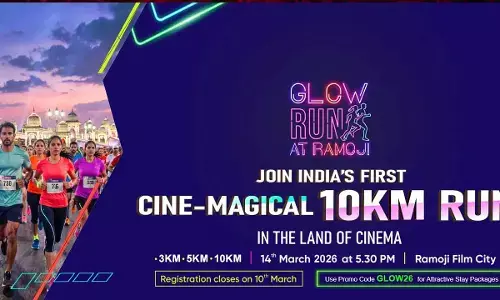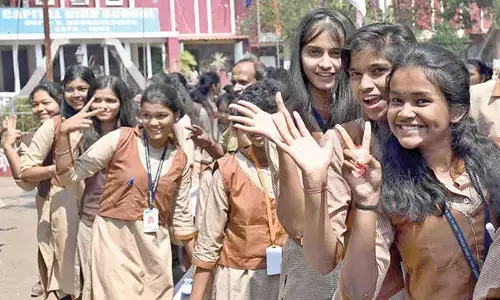Swami Vivekananda is a true icon for our youth

Swami Vivekananda was an incredibly versatile personality with a vast knowledge of different subjects including Western philosophy. He was the first Hindu monk of India, who spread the message of Hinduism and Sanatan dharma.
Swami Vivekananda was an incredibly versatile personality with a vast knowledge of different subjects including Western philosophy. He was the first Hindu monk of India, who spread the message of Hinduism and Sanatan dharma. He established the supremacy of Sanatan values, culture and Hinduism in a decisive manner. It was a great achievement as this was done by Swami Vivekananda, born on January 12, 1863 in Kolkata, at a time when the whole world used to look down upon us.
Blessed with a yogic temperament, he used to practise meditation even from his boyhood. Inquisitive to the core, his life underwent a sea change ever since he came into contact with Sri Ramakrishna Paramhans, which later on developed into a unique guru-disciple relationship with fewer parallels in the history of spiritual masters. He once asked Shri Ramakrishna Paramhans one day in November 1881: "Sir, have you seen God?" He replied: "Yes, I have. I see Him as clearly as I see you, only in a much intenser sense."
Under the divine guidance of Shri Ramakrishna Paramhans, Swami Vivekananda made strides on the spiritual path. His speech at the World's Parliament of Religions, Chicago, on September 11, 1893 left an indelible mark on the gathering comprising religious and spiritual personalities of different faiths from across the world. He started his speech by addressing the gathering from the core of his heart as 'Sisters and brothers of America' which was followed by thunderous applause from the audience.
He said: "It fills my heart with joy unspeakable to rise in response to the warm and cordial welcome which you have given us. I thank you in the name of the most ancient order of monks in the world; I thank you in the name of the mother of religions; and I thank you in the name of the millions and millions of Hindu people of all classes and sects."
Swami ji went on to add: "I am proud to belong to a religion which has taught the world both tolerance and universal acceptance. We believe not only in universal toleration but we accept all religions as true ... I am proud to belong to a nation which has sheltered the persecuted and the refugees of all religions and all nations on earth." Swami ji was of the firm opinion that all paths lead to the one true God, as is also mentioned in Rig Veda that 'Ekam Sat Vipra Bahuda Vadanti' (Truth is one; the wise call it by various names.)
His views of modern Indian secularism were based on equal respect for all faiths. He supported religious tolerance as a part of public culture, as he wanted harmony and peace. It was not a mere hollow proposition but a strong intent to serve the people with compassion and without any discrimination either on the basis of caste or religion. There was no place for appeasement in his views on secularism. It was all inclusive, which he preached in the US and the UK he visited extensively after delivering the historic lecture at the Parliament of the World Religions in 1893.
When he returned to India four years later, he was full of reverence for the country as he realised well that there is no match to India. He admitted that the west was much ahead of us in terms of materialism but India was far ahead in terms of spiritual values and ethos. He immensely felt that every bit of our motherland was pious and inspiring. On his return from the US and the UK, he lied down on the earth and started rolling. He felt that by doing so he would be purified. Such was his love for motherland (Maa Bharti)!
Swami Vivekananda's concept of potential divinity of the soul, principle of morality and ethics, and being a bridge between the East and the West, and sense of unity, pride in the past, and the sense of mission are real assets for us. He defined and strengthened the sense of unity for us as a nation, giving a proper understanding of our country's great spiritual heritage. Netaji Subhas Chandra Bose wrote: "Swamiji harmonized the East and the West, religion and science, past and present. And that is why he is great. Our countrymen have gained unprecedented self-respect, self-reliance and self-assertion from his teachings." In the words of eminent British historian A L Basham, "in centuries to come, he will be remembered as one of the main moulders of the modern world…!"
Swami Vivekananda was an inspirational personality and he had great expectations from youths. For him, youth was the harbinger of hope and the fulcrum of change. His clarion call – Arise awake and stop not until the goal is reached – still reverberates in our hearts and minds. He said that what he wanted youth with muscles of iron, nerves of steel and gigantic hearts. He wanted the youth of the country to have strong will power to serve the motherland and masses. He once said: "Go, all of you, wherever there is an outbreak of plague or famine, or wherever the people are in distress, and mitigate their sufferings" by serving the country.
Inspired by the concept and ideals of Swami Vivekananda, Prime Minister Narendra Modi ji has started Atma Nirbhar Swasth Bharat campaign with an outlay of about Rs 64,180 crore for over six years, that is, till FY 25-26. It aims among other things to support 17,788 rural Health and Wellness Centres in 10 high focus states, establishing 11,024 urban Health and Wellness Centres in all the states and establishing critical care hospital blocks in 602 districts and 12 central institutions. The move assumes significance in view of the fact that healthy people are the key to building a strong and vibrant society.
During his travels all over India, Swami Vivekananda was deeply moved to see the appalling poverty and backwardness of the masses, in particular the downtrodden. He was the first religious leader in India to understand and openly declare that the real cause of India's downfall was the neglect of the masses. They had lost their faith in their capacity to improve their lot due to centuries of oppression. He realised that despite poverty, 'the masses clung to religion, but they had never been taught the life-giving, ennobling principles of Vedanta and how to apply them in practical life.'
He saw education as the only means to improve their economic condition, and spiritual knowledge to infuse in them faith in themselves and strengthen their moral sense. What was education for him? In his own words: "The education which does not help the common mass of people to equip themselves for the struggle for life, which does not bring out strength of character, a spirit of philanthropy, and the courage of a lion — is it worth the name? Real education is that which enables one to stand on one's own legs." That is self-confidence!
Our new National Education Policy-2020 (NEP-2020), another landmark initiative of Prime Minister Narendra Modi ji, is in sync with the scientific temperament of Swami Vivekananda, his ethical values and vision to build a new India. The policy imbibes the vision of Swami Ji to ensure holistic and inclusive empowerment of the downtrodden through education and will be a game changer. Some of the key features of NEP-2020 include Gender Inclusion Fund for promoting education for girls, provision for equal and inclusive education, gross enrolment ratio in higher education including vocational education to be increased to 50 per cent by 2035, and 3.5 crore new seats to be added to higher education institutions, and education in mother tongue.
As a divine soul, Swami Vivekananda visualised the role of science and technology in improving the life of human beings. So when he met Jamshedji Tata on a ship, he asked his help in creating human capital dedicated to sciences. Jamshedji Tata, inspired by the words of Swami Vivekananda, established the Indian Institute of Science, Bengaluru! Swami ji wanted to "bring the best aspects of both the traditional Hindu and Western systems of education." New NEP-2020 intends to increase gross enrolment ratio in higher education including vocational education to 50 per cent by 2035.
During Amrit Kaal, let's make the most of the teachings of Swami Vivekananda, a great philosopher, thinker, orator, poet, and the greatest patron of the youth, to make an Atmanirbhar Bharat! We celebrate January 12, the birth anniversary of Swami Vivekananda, as the National Youth Day, to draw inspiration from the "philosophy of Swami ji and the ideals for which he lived and worked could be a great source of inspiration for the Indian Youth." The dream of Ek Bharat, Sarvshrestha Bharat and making India Vishwa Guru can be realised by following the path shown by Swami Vivekananda, which is at the centre of the governance of Prime Minister Narendra Modi ji. Let us resolve today to assimilate the essence of teachings of Swami Vivekananda – national spirit, patriotism, unity in diversity, inclusivity and purity! This will be the real tribute to Swami Vivekananda.
(The views expressed are strictly personal of the author)











